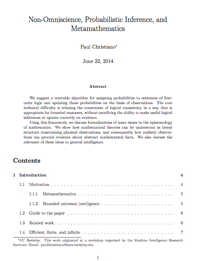 UC Berkeley student and MIRI research associate Paul Christiano has released a new report: “Non-omniscience, probabilistic inference, and metamathematics.”
UC Berkeley student and MIRI research associate Paul Christiano has released a new report: “Non-omniscience, probabilistic inference, and metamathematics.”
Abstract:
We suggest a tractable algorithm for assigning probabilities to sentences of first-order logic and updating those probabilities on the basis of observations. The core technical difficulty is relaxing the constraints of logical consistency in a way that is appropriate for bounded reasoners, without sacrificing the ability to make useful logical inferences or update correctly on evidence.
Using this framework, we discuss formalizations of some issues in the epistemology of mathematics. We show how mathematical theories can be understood as latent structure constraining physical observations, and consequently how realistic observations can provide evidence about abstract mathematical facts. We also discuss the relevance of these ideas to general intelligence.
What is the relation between this new report and Christiano et al.’s earlier “Definability of truth in probabilistic logic” report, discussed by John Baez here? In this new report, Paul aims to take a broader look at the interaction between probabilistic reasoning and epistemological issues, from an algorithmic perspective, before continuing to think about reflection and truth in particular.